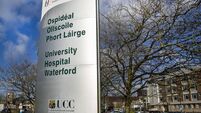Irish study links legal semi-synthetic cannabis to psychosis

Psychiatrists and doctors from University of Galway and Mercy University Hospital Cork said HHC is "readily available" online and in retail vape shops in Ireland. File picture
Irish researchers have documented two cases of psychotic illness linked to the use of legally available semi-synthetic cannabis.
In what is thought to be the first such study in scientific literature, the research points out that the drug, HHC, should be included in legislation banning the sale of similar products.
Psychiatrists and doctors from University of Galway and Mercy University Hospital Cork said HHC is "readily available" online and in retail vape shops in Ireland.
HHC use was linked to adverse reactions in a school in Cork last November when four teenage children became ill after vaping the drug — sparking warnings from the HSE.
In a paper in the Irish Journal of Psychological Medicine, the researchers detail two cases.
In the first, a 20-year-old man presented to an ED complaining of distressing psychotic symptoms, including delusions and auditory hallucinations. “He feared that he would be sent to prison and that he may have killed one of his friends,” the research said.
It said the man had been a habitual cannabis user for three years. His consumption however had changed in the two months prior to admission in that he began taking a HHC vape and vaped daily.
Admitted to psychiatric services he presented as fearful and persecuted, with thoughts of self-harm.
“He spent prolonged periods praying with a Bible or rosary beads,” the paper said.
It said the patient responded well to anti-psychotic medication. After two weeks he was discharged and was weaned off the medication over five months.
In the second case, a man in his 30s, presented to psychiatric services after purchasing a vape from a shop, which was the same branded vape as in the first case. The man said one vape lasted him about a week.
He was admitted and observed pacing around the ward, keeping office doors open and sat in a doorway. He displayed a perplexed appearance, with bizarre speech.
After being prescribed medication his condition improved dramatically and he was discharged. Following a review nine months later he had returned to normal.
The research said the current legal status of HHC appears to be based on it being classified a non ‘psychoactive substance’ under the Criminal Justice (Psychoactive Substances) Act 2010.
“Although there is a lack of scientific literature on HHC’s acute effects on humans, we contend that this is a misclassification,” the paper said. “Many online accounts, and accounts communicated to this author, outline its psychoactive effects, and indeed stores themselves often advertise the product as intoxicating.”
It added: “Our case series suggest that HHC does indeed contribute to induction of psychotic illness.”





